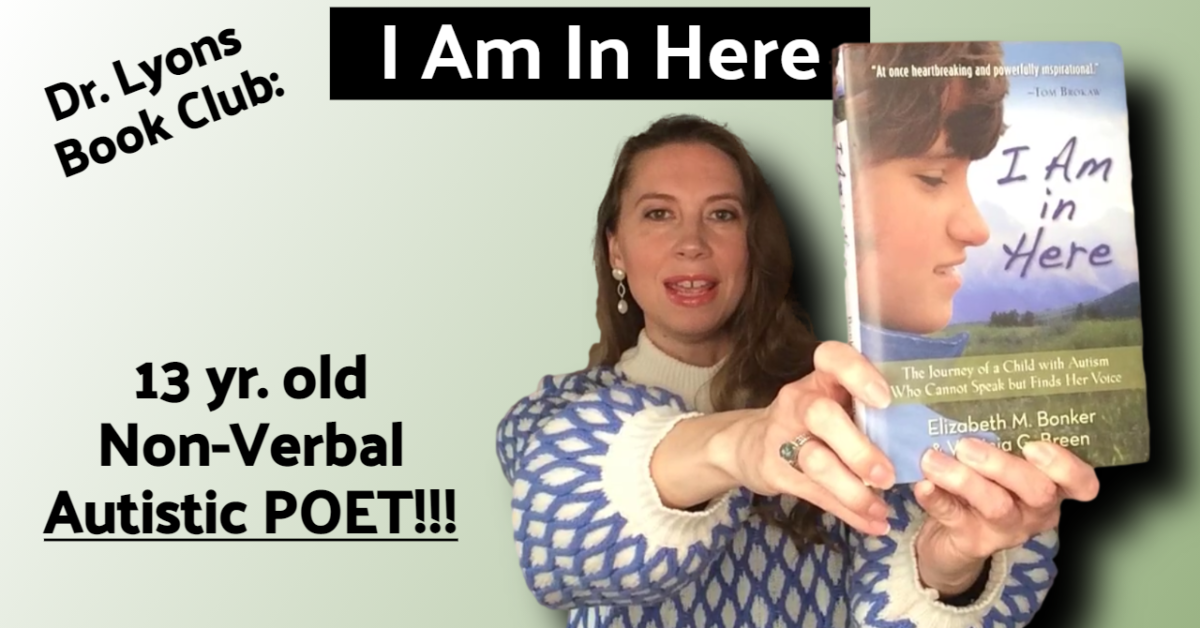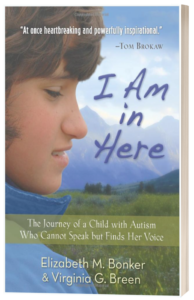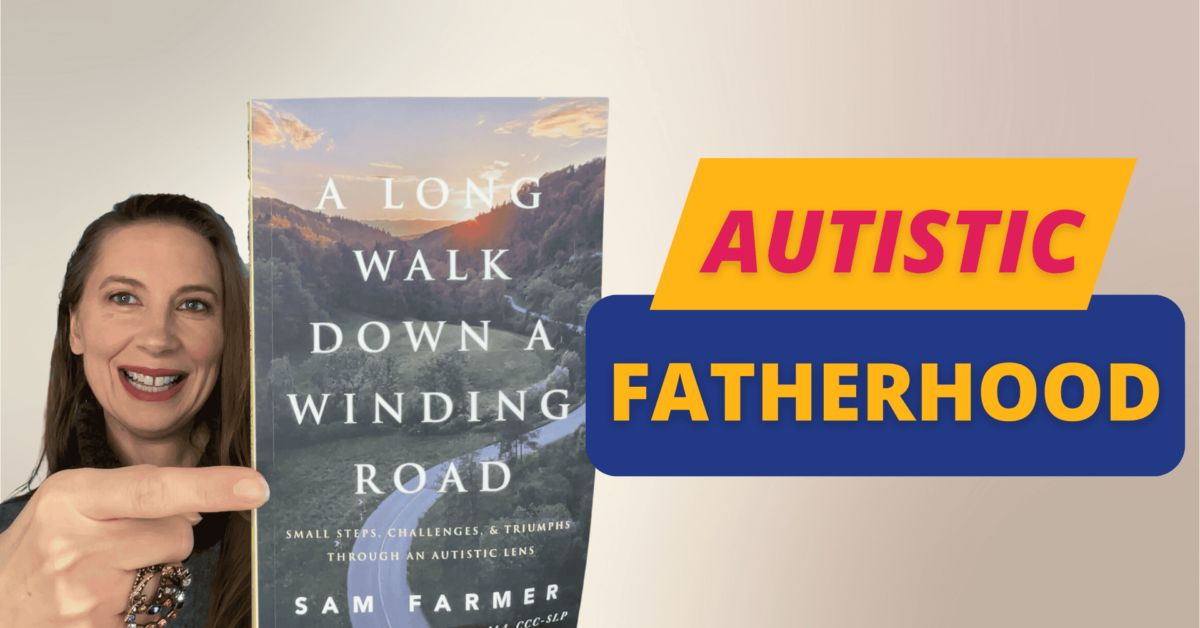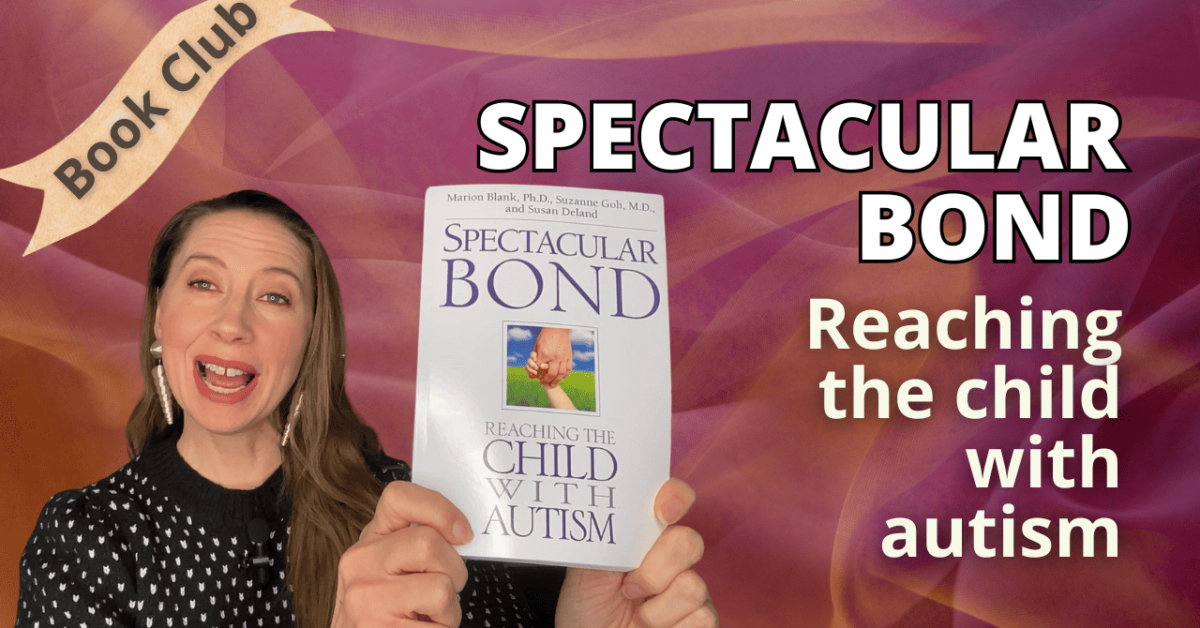The poem is titled ‘Me Revisited’:
“I can’t sit still. What’s wrong with me?
My body is doing things I can’t explain.
My dignity, I am trying to maintain.
People stare at me when I rock and shake.
I don’t know how much more I can take.
So much to deal with going on inside me.
I wish I could get better.
I want to be set free from my silent cage.”
Ever wonder what your child with nonspeaking autism is thinking? You are about to find out…
This month’s book club is:
I Am in Here: The Journey Of A Child With Autism Who Cannot Speak But Finds Her Voice
Let’s get into the book. Here’s a poem that Elizabeth wrote. Now remember, Elizabeth can’t speak!
She wrote:
“I sometimes fear that people cannot understand that I hear
and I know that they don’t believe I go to every extreme to try to express my need to talk.
If only they could walk in my shoes, they would share my news.
I am in here and trying to speak every day in some kind of way.”
Elizabeth writes poetry that really expresses her thoughts, who she is. She can’t speak, but she can type, and that’s how she gets her thoughts out there.
Elizabeth writes Bright Future:
“When you see a tree, think of me, growing strong and tall.
When you see the sun shining brightly, think of me tough and mighty.
When you see the water on the lake, think of the future I plan to make me strong, mighty, free!”
Is that not just a great inspiration, a great encapsulation of what a determined human being is? And maybe you have that same feeling for your child if they can’t speak or even if they can speak but you don’t feel like you’re truly getting to know who they are. Oh my goodness! This book is a great book in providing insight into what your child might be thinking.
Another poem by Elizabeth:
‘Me Revisited‘
“I can’t sit still.
What’s wrong with me?
My body is doing things I can’t explain.
My dignity, I am trying to maintain.
People stare at me when I rock and shake.
I don’t know how much more I can take.
So much to deal with going on inside me, I wish I could get better. I want to be set free from my silent cage.”
She goes on to write “Some of the people at school who do not know me make me feel uncomfortable. They stare at me. I would not rock and shake if I could stop it. It just happens sometimes. I wish they could understand, but mostly I wish I could explain it to them.”
And you might be having this same experience with your child how, sometimes their body just does things and you’re like, “I don’t understand it!”
Well from Elizabeth’s writing, she doesn’t understand it either! She doesn’t want it to happen. She’s not trying to make it happen. She wishes it wasn’t happening and it just provides a little more insight, so hopefully you can have some more compassion and in some ways if you’re doing something with someone, and they have certain behaviors, if you can focus on what they’re doing, well, it definitely will go far because they’re not always trying to use behaviors to get out of things. Sometimes it’s just really hard for them, in their words, to control their body, to do what they wanted to do.
And I think it’s important to have this insight from someone who can’t speak, who has autism and wants to educate others as to what’s going on. What’s going on with their body, what’s going on in their mind so that we can better help them. She wants help. She doesn’t want her body to be out of control. Who does? So this is a really good insight if you have these similar questions about why your child is doing certain things.
Some of them might be behavior related. Using behavior as a functional way to communicate. Sometimes their body, they just can’t control the way they want to. But it’s important to know that they want to.
And it might be hard for you to know that specifically from your child if they haven’t learned an efficient way to communicate yet.
Here’s another poem that Elizabeth wrote:
‘Upset today‘
“I get so angry and upset because my expectations are not met.
I can’t think of a better way to make you see what I want to say.
I’m always sorry later, trust me when I say I would rather have a nice day!”
She wrote that at the age of nine!
And she goes on to comment here that upset today was a poem that she wrote after she had an extremely bad day.
And so here’s a quote from her.
“I’m not always able to show people how I am feeling. Sometimes I am not feeling well inside or I have a hard time focusing sounds or smells that bother me do not seem to be noticed at all by others. I struggle to fit in and succeed most days. But like everyone else, I have a bad day every once in a while”
And we all know that it happens. Oh! bad days, they are so not fun! Not fun for anyone. Not fun for the parent, for the teacher, for the child. It’s good to have this insight, though.
And if you’ve ever wondered how much your child notices about you. Maybe you might feel, “Oh, they don’t really notice me. They don’t care about me.” You know, they may not be showing affection in certain particular ways. Let’s read a little about this.
So this is what Temple Grandin’s mother wrote in her own book, and Elizabeth’s mom is quoting it here:
“The first truth I stumbled on all those years ago – If I didn’t survive, Temple wouldn’t survive.”
So Elizabeth’s mother goes on to write that recently she had hurt her back quite bad, and this is her writing:
“The only pain I can compare this to is the pain of childbirth. I think being forced to remain flat on my back for a month was God’s way of telling me to slow down before I killed myself.”
And now here’s a poem that Elizabeth wrote in response to seeing her mom in so much pain. It’s titled as follows:
‘Mom’s Pain’
“God, help my mother.
She is more dear to me than any other.
She is in such pain.
I know that it is hard for her to refrain.
From doing for us like she usually does.
Let her know we are all Okay and make her better.”
And Elizabeth wrote, “My mom hurt her back and I wanted her not to worry about me.”
How sweet is that? It might be very hard for your child to express that kind of love and compassion towards you.
We always talk about the parent expressing compassion towards the child, but the children are aware and they know how much work you’re doing to help them.
And they want you to be well, too. And I think this is a really beautiful insight into how much our children with autism, whether they’re speaking or not, have awareness of what’s going on with us.
And the last poem that I’ll read here by Elizabeth is called…
‘Your Insights’
“A Cry, a tear, a trail of fear.
The Pain Inside, too strong to hide.
A sigh!
Oh, my!
Why?”
And her mother didn’t understand this poem, and so she asked for an explanation, and this poem actually is not about Elizabeth at all. So Elizabeth writes, “When I wrote this poem, I was inspired by the war in Iraq. As children growing up in the United States, we don’t hear bombs or guns firing. I feel a terrible sadness in my heart for these children who live in fear and don’t know why.”
Talk about compassionate. Oh, my God, what a beautiful young lady that is. To be able to have so many obstacles in her own life, but then yet be so compassionate and understanding and taking herself and understanding the world from their perspective, that it’s just amazing.
So many times people with autism are written off,
“Oh, they can’t understand things”, “Oh, they don’t understand news”, “They can’t understand other people’s suffering. They don’t even understand their own.” I mean, so many things are said, and they’re all erroneous and so hopefully this poem and this writing by Elizabeth has shown you that there’s so much more to your child than they’re able to express.
So keep looking for those solutions and looking for ways for your child to really express who they are, who they truly are, who their character is.
And you’ll be amazed by the wonderful child that you’re raising because you’re a wonderful parent.
I know that.
If you’re reading this blog post, you are a wonderful parent.
You’re doing a great job. Keep going.
So I certainly recommend this book. It’s a great book.
If you want to get more insight into what your child might be thinking right now, this is one perspective, but it certainly is a great one.





